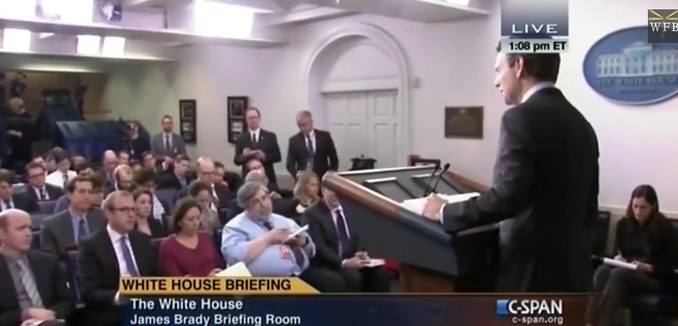Administration spokespeople were caught flat-footed after defending President Barack Obama’s characterization of the shootings at a Paris kosher market as “random,” only to back down after criticism later in the day.
In a interview yesterday with Vox.com, President Obama referred to the terrorist who killed four Jews at the Hyper Cacher supermarket in Paris as “a bunch of violent, vicious zealots who … randomly shoot a bunch of folks in a deli in Paris.”
On Bret Baier’s Special Report last night, NPR’s Mara Liasson defended President Obama use of the term “randomly” as a means to steer the conversation away from the idea there is “a war on Islam or … anything that might be interpreted to suggest that.” But Liasson argued that however well-meaning the president had been, “all the Jews in France who are making plans to leave do not think that the deli was randomly targeted. It was targeted because it was a Jewish deli. And the cartoonists at Charlie Hebdo might have been targeted because of something they did. But the people in that grocery store were targeted because of who they were.”
Earlier today, White House spokesman Josh Earnest defended the president’s characterization of the attack on Hyper Cacher as “random” in an exchange with ABC’s Jonathan Karl.
The Weekly Standard recorded the exchange (embedded below) between Karl and Earnest.
“These individuals were not targeted by name,” Earnest added.
“Not by name, but by religion, were they not?” Karl asked.
“There were people other than just Jews who were in that deli,” Earnest said.
After Karl asked again if there was any doubt by the president that the shop was attacked because of the likelihood the terrorists would be able to kill Jews, Earnest finally said, “No.”
Associated Press reporter Matt Lee had a similar exchange (embedded below) with State Department spokesperson Jen Psaki:
“Does the administration really believe that the victims of this attack were not singled out because they were of a particular faith?” asks AP reporter Matt Lee.
“Well, as you know, I believe if I remember the victims specifically, they were not all victims of one background or one nationality,” Psaki said.
“Does the administration believe this was an anti-Jewish or an attack on a Jewish community in Paris?” Lee pressed.
“I don’t think we’re going to speak on behalf of French authorities,” Psaki responded.
After being criticized by writers such as Jonathan Chait of New York magazine, who characterized the episode as “bizarre,” both Psaki and Earnest issued clarifications on Twitter.
We have always been clear that the attack on the kosher grocery store was an anti-semitic attack that took the lives of innocent people.
— John Kirby (@statedeptspox) February 10, 2015
Our view has not changed. Terror attack at Paris Kosher market was motivated by anti-Semitism. POTUS didn't intend to suggest otherwise.
— Josh Earnest (@PressSec) February 10, 2015
For a broader view on the implications of the Hyper Cacher attacks in France and beyond, read Charlie Hebdo and the Future of Europe, written by associate editor Benjamin Kerstein for the February 2015 issue of The Tower Magazine.
[Photo: Washington Free Beacon / YouTube ]




